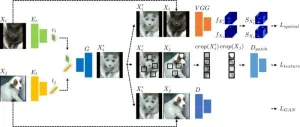(Press-News.org) Giant gas planets can be agents of chaos, ensuring nothing lives on their Earth-like neighbors around other stars. New studies show, in some planetary systems, the giants tend to kick smaller planets out of orbit and wreak havoc on their climates.
Jupiter, by far the biggest planet in our solar system, plays an important protective role. Its enormous gravitational field deflects comets and asteroids that might otherwise hit Earth, helping create a stable environment for life. However, giant planets elsewhere in the universe do not necessarily protect life on their smaller, rocky planet neighbors.
A new Astronomical Journal paper details how the pull of massive planets in a nearby star system are likely to toss their Earth-like neighbors out of the “habitable zone.” This zone is defined as the range of distances from a star that are warm enough for liquid water to exist on a planet’s surface, making life possible.
Unlike most other known solar systems, the four giant planets in HD 141399 are farther from their star. This makes it a good model for comparison with our solar system where Jupiter and Saturn are also relatively far from the sun.
“It’s as if they have four Jupiters acting like wrecking balls, throwing everything out of whack,” said Stephen Kane, UC Riverside astrophysicist and author of the journal paper.
Taking data about the system’s planets into account, Kane ran multiple computer simulations to understand the effect of these four giants. He wanted specifically to look at the habitable zone in this star system and see if an Earth could remain in a stable orbit there.
“The answer is yes, but it’s very unlikely. There are only a select few areas where the giants’ gravitational pull would not knock a rocky planet out of its orbit and send it flying right out of the zone,” Kane said.
While this paper shows giant planets outside the habitable zone destroying the chances for life, a second, related paper shows how one big planet in the middle of the zone would have a similar effect.
Also published in the Astronomical Journal, this second paper examines a star system only 30 light years away from Earth called GJ 357. For reference, the galaxy is estimated to be 100,000 light years in diameter, so this system is “definitely in our neighborhood,” Kane said.
Earlier studies found that a planet in this system, named GJ 357 d, resides in the system’s habitable zone and has been measured at about six times the mass of the Earth. However, in this paper titled “Agent of Chaos,” Kane shows the mass is likely much bigger.
“It’s possible GJ 357 d is as much as 10 Earth masses, which means it’s probably not terrestrial, so you couldn’t have life on it,” Kane said. “Or at least, it would not be able to host life as we know it.”
In the second part of the paper, Kane and his collaborator, UCR planetary science postdoctoral scholar Tara Fetherolf, demonstrate that if the planet is much larger than previously believed, it is certain to prevent more Earth-like planets from residing in the habitable zone alongside it.
Though there are also a select few locations in the habitable zone of this system where an Earth could potentially reside, their orbits would be highly elliptical around the star. “In other words, the orbits would produce crazy climates on those planets,” Kane said. “This paper is really a warning, when we find planets in the habitable zone, not to assume they are automatically capable of hosting life.”
Ultimately, the pair of papers shows how uncommon it is to find the right set of circumstances to host life elsewhere in the universe. “Our work gives us more reasons to be very grateful for the particular planetary configuration we have in our solar system,” Kane said.
END
Giant planets cast a deadly pall
How they can prevent life in other solar systems
2023-10-31
ELSE PRESS RELEASES FROM THIS DATE:
GED recipients have worse health outcomes than high school graduates
2023-10-31
Toronto, ON — New research published earlier this month in the International Journal of Aging and Human Development has highlighted the significant health disparities among older adults with a General Education Development (GED) certificate compared to their peers with a high school diploma.
Researchers from the University of Toronto examined health outcomes among approximately 400,000 older adults from the American Community Survey, a representative sample of community-dwelling and institutionalized older Americans. They found that ...
Antibiotics for common childhood infections no longer effective
2023-10-31
Drugs to treat common infections in children and babies are no longer effective in large parts of the world, due to high rates of antibiotic resistance.
The University of Sydney led study found many antibiotics recommended by the World Health Organization (WHO) had less than 50 percent effectiveness in treating childhood infections such as pneumonia, sepsis (bloodstream infections) and meningitis. The findings show global guidelines on antibiotic use are outdated and need updates.
The most seriously ...
One-stop solution for shaping and outlining objects
2023-10-31
Approximately 80% of Apple's latest iPhone 15 pre-orders in Korea fall within the age group of 20s and 30s. Their keen interest in this expensive device is primarily attributed to tis camera's ability to deliver sharp and particular mood of colors, a hallmark of iPhones. If it can achieve high quality image and video without the need for multiple lenses, it may garner greater support from millennials and generation Z.
A collaborative research team led by Professor Junsuk Rho from the Department of Mechanical Engineering and the ...
DGIST expands its global student exchange partnerships after concluding agreements with Grenoble INP-UGA in France and NYCU in Taiwan
2023-10-31
□ Daegu Gyeongbuk Institute of Science and Technology (DGIST), led by President Yang Kook, signed credit exchange agreements with two prestigious global universities, National Yang Ming Chiao Tung University (NYCU) in Taiwan and Grenoble INP-UGA in France, on August 15 (Tuesday) and August 23 (Wednesday), 2023, respectively, to expand its global student exchange partnerships. Based on these agreements, DGIST will operate student exchange programs with the two universities, allowing participating students to earn credits by completing regular courses.
□ These agreements were concluded through the ...
DGIST develops an artificial intelligence model for effectively removing biases in a dataset
2023-10-31
□ Daegu Gyeongbuk Institute of Science and Technology (DGIST), led by President Yang Kuk, announced on September 6, 2023 (Wednesday) that the research team of Professor Sang-hyun Park at the Department of Robotics and Mechatronics Engineering had developed a new image translation model that could effectively reduce biases in data. In the process of developing an artificial intelligence (AI) model using images collected from different sources, contrary to the user’s intention, data biases may occur because of various factors. The developed model can remove data biases despite the absence of information on such factors, thereby ...
Breaking glass ceilings instead of feet
2023-10-31
In a time when bound feet, arranged marriages, and subservience were prevalent, Hui-lan, Ida, and Lucy forged a path that broke free from cultural stereotypes. They skilfully flew airplanes, managed Asia's most opulent estates, and charmed the Western world with their impeccable sense of style and sophistication. Their courage and determination not only shattered stereotypes but also paved the way for countless others to follow in their footsteps.
Daryl Yeap, a celebrated author and historian, invites readers on a captivating journey into the lives of three remarkable women—Hui-lan, Ida, and Lucy—in her upcoming book, As Equals: The Oei ...
$20 million grant from the National Cancer Institute enables research into youth e-cigarette and oral nicotine use at USC
2023-10-31
USC faculty members Adam Leventhal, PhD and Caryn Lerman, PhD have received a $20 million grant for research to inform government regulations overseeing tobacco and its marketing, with a focus on protecting young people. The USC Tobacco Center of Regulatory Science (TCORS), an interdisciplinary initiative led by the USC Institute for Addiction Science (IAS), USC Norris Comprehensive Cancer Center and the Department of Population and Public Health Sciences at the Keck School of Medicine of USC, is one of seven programs nationwide to receive funding provided jointly by the Food ...
Groundbreaking study reveals link between air pollution and incidence of Parkinson’s disease
2023-10-31
A new study led by researchers at Barrow Neurological Institute has found that people living in regions with median levels of air pollution have a 56 percent greater risk of developing Parkinson’s disease compared to those living in regions with the lowest level of air pollution.
The study, which will be published online on Monday, Oct. 30 in Neurology - the medical journal of the American Academy of Neurology - was conducted to identify national, geographic patterns of Parkinson’s disease and test for nationwide and region-specific associations with fine particulate matter.
“Previous studies ...
Australasia’s hidden pollination crisis could threaten biodiversity and food security
2023-10-31
Australasia has likely overlooked a pollination crisis, according to new research published today in the journal Ecology and Evolution. The research, led by Macquarie University, also underscores a pressing need for intervention to avoid biodiversity loss and long-term food insecurity in the region.
The authors analysed thousands of research papers on human-induced pollinator decline globally, and found despite only a tiny portion mentioning Australasia, the causes of pollinator decline in the northern hemisphere were mirrored in this region.
Research in Europe and North America finds threats that include ...
Late not great – imperfect timekeeping places significant limit on quantum computers
2023-10-30
New research from a consortium of quantum physicists, led by Trinity College Dublin’s Dr Mark Mitchison, shows that imperfect timekeeping places a fundamental limit to quantum computers and their applications. The team claims that even tiny timing errors add up to place a significant impact on any large-scale algorithm, posing another problem that must eventually be solved if quantum computers are to fulfil the lofty aspirations that society has for them.
It is difficult to imagine modern life without clocks to help organise our daily schedules; with a digital clock in every person’s smartphone or watch, we ...
LAST 30 PRESS RELEASES:
Antipathy toward snakes? Your parents likely talked you into that at an early age
Sylvester Cancer Tip Sheet for Feb. 2026
Online exposure to medical misinformation concentrated among older adults
Telehealth improves access to genetic services for adult survivors of childhood cancers
Outdated mortality benchmarks risk missing early signs of famine and delay recognizing mass starvation
Newly discovered bacterium converts carbon dioxide into chemicals using electricity
Flipping and reversing mini-proteins could improve disease treatment
Scientists reveal major hidden source of atmospheric nitrogen pollution in fragile lake basin
Biochar emerges as a powerful tool for soil carbon neutrality and climate mitigation
Tiny cell messengers show big promise for safer protein and gene delivery
AMS releases statement regarding the decision to rescind EPA’s 2009 Endangerment Finding
Parents’ alcohol and drug use influences their children’s consumption, research shows
Modular assembly of chiral nitrogen-bridged rings achieved by palladium-catalyzed diastereoselective and enantioselective cascade cyclization reactions
Promoting civic engagement
AMS Science Preview: Hurricane slowdown, school snow days
Deforestation in the Amazon raises the surface temperature by 3 °C during the dry season
Model more accurately maps the impact of frost on corn crops
How did humans develop sharp vision? Lab-grown retinas show likely answer
Sour grapes? Taste, experience of sour foods depends on individual consumer
At AAAS, professor Krystal Tsosie argues the future of science must be Indigenous-led
From the lab to the living room: Decoding Parkinson’s patients movements in the real world
Research advances in porous materials, as highlighted in the 2025 Nobel Prize in Chemistry
Sally C. Morton, executive vice president of ASU Knowledge Enterprise, presents a bold and practical framework for moving research from discovery to real-world impact
Biochemical parameters in patients with diabetic nephropathy versus individuals with diabetes alone, non-diabetic nephropathy, and healthy controls
Muscular strength and mortality in women ages 63 to 99
Adolescent and young adult requests for medication abortion through online telemedicine
Researchers want a better whiff of plant-based proteins
Pioneering a new generation of lithium battery cathode materials
A Pitt-Johnstown professor found syntax in the warbling duets of wild parrots
Cleaner solar manufacturing could cut global emissions by eight billion tonnes
[Press-News.org] Giant planets cast a deadly pallHow they can prevent life in other solar systems







